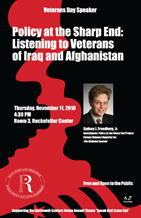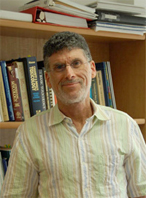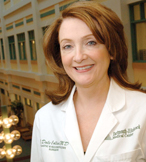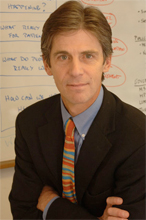2010-2011 Public Programs
Summer 2011 Rockefeller Center Public Program
 Anna Post
Anna Post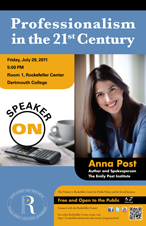
Author and Spokesperson
The Emily Post Institute
"Professionalism in the 21st Century"
Friday, July 29, 2011
5:00 PM • Room 1, Rockefeller Center, Dartmouth College
The Nelson A. Rockefeller Center for Public Policy and the Social Sciences
Anna Post is the great-great-granddaughter of Emily Post and the author and co-author of several books including Emily Post’s Etiquette, 18th Edition (October 2011), Great Get-Togethers, and Mr. Manners.
A modern etiquette expert, Anna covers topics ranging from business etiquette to politics and pop culture. A regular contributor to Reuters and DailyWorth.com, Anna conducts business etiquette seminars across the country, working with clients such as Emerson Process, Walgreens, Ivy Funds and Raymond James. She also speaks nationally at conferences, bridal shows and events and is a columnist for Inside Weddings magazine. Anna has worked with companies such as Intel, The Body Shop, Princess Cruises, 3M, Hyatt Place Hotels, and Skype to promote their brands to national media.
Anna is a popular source for media outlets such as USA Today, The New York Times, the Associated Press, The Wall Street Journal, The Los Angeles Times, BBC.com, and Real Simple, and has appeared on The Today Show, The Early Show, Good Morning America, and NPR.
Anna worked previously for the Motion Picture Association of America and in the Washington, D.C. office of Senator Patrick Leahy. A graduate of Phillips Academy and the University of Vermont, she currently lives in Burlington, Vermont.
Spring 2011 Rockefeller Center Public Programs
Thursday, March 31, 2011
2011 Ad Fontes Forum: "Guess What’s Coming to Dinner Genetically Modified Foods: Panacea or Pandora’s Box?"
4:30 PM • Moore Theater, Hopkins Center for the Arts
Cosponsored with The Nelson A. Rockefeller Center for Public Policy and the Social Sciences, Office of the Provost, Office of the Dean of Faculty, Special Programs and Events Committee, Dartmouth Biology Department, Dartmouth Geography Department, Ethics Institute, The Dartmouth Undergraduate Journal of Science (DUJS) will host the inaugural Ad Fontes forum on the evening of March 31st from 4:30 to 6:30 in Moore Theater at the Hopkins Center.
In recent years, overpopulation, climate change, and a host of other factors have resulted in widespread food shortages throughout the developing world. This, in conjunction with the growing presence of engineered organisms in the United States food industry has catapulted the issue of genetically modified crops to the forefront of national and global dialogues. The purpose of the first Ad Fontes forum is to engage the Dartmouth community in these dialogues and to present both sides of the debate, exploring the risks and benefits, the hopes and fears, of a controversial technology.
Admission for the 2011 Ad Fontes forum is free and open to the public. Following the forum, a reception catered by the Hanover Inn will be held for attendees and panelists at the Top of the HOP in the Hopkins Center.
Moderator: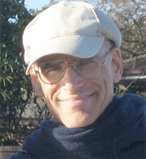 David Peart, Professor, Biology Department, Dartmouth College
David Peart, Professor, Biology Department, Dartmouth College
David Peart and his students analyze the factors affecting the growth and survival of trees, the dynamics of populations, and the composition and structure of forests. They address questions about competition, herbivory, species diversity, invasion, and forest conservation and management. Some of their tropical work has linked forest ecology with social sciences - for example, economics and analyses of land use practices.
Peart is interested in strengthening the links between research priorities and the difficult (but exciting) challenges we face as we navigate the transition to a sustainable world.
Panelists:
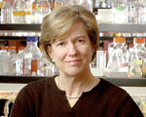 Nina V. Fedoroff Former Science and Technology Adviser to the Secretary of State
|
Nina V. Fedoroff received her Ph.D. in Molecular Biology from the Rockefeller University, and has served on the faculties of the Carnegie Institution of Washington, the Johns Hopkins University and the Pennsylvania State University, where she was the Director of the Biotechnology Institute and the founding Director of the Huck Institutes of the Life Sciences. Fedoroff has published two books and more than 140 papers in scientific journals. She is a member of several academies, including the U. S. National Academy of Sciences and the American Academy of Arts and Sciences. Among her awards is a 2006 National Medal of Science, the highest honor awarded to US scientists. Fedoroff served as the Science and Technology Adviser to the Secretary of State and to the Administrator of the US Agency for International Development (USAID) from 2007 to 2010. She is an Evan Pugh Professor at Penn State, a member of the External Faculty of the Santa Fe Institute and Distinguished Visiting Professor of the King Abdullah University of Science and Technology (KAUST) in Saudi Arabia. She is also President of the American Association for the Advancement of Science (AAAS). |
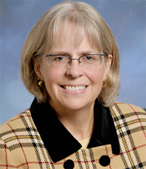 Sharon Bomer Lauritsen Executive Vice President of the Food and Agriculture Section at the Biotechnology Industry Organization |
Sharon Bomer Lauritsen is Executive Vice President of the Food and Agriculture Section at the Biotechnology Industry Organization (BIO). BIO represents more than 1,100 biotechnology companies, academic institutions, state biotechnology centers and related organizations across the United States and 31 other nations, which are involved in the research and development of healthcare, agricultural, industrial and environmental biotechnology products. Bomer assumed the position of Executive Vice President in May 2007 and leads and manages BIO’s Food and Agriculture Section on public policy activities, including overseeing relationships with a wide range of international, federal, state and local entities. She also serves as the Executive Director for the Council for Biotechnology Information, a trade association which communicates science-based information about the benefits and safety of agricultural and food biotechnology. Prior to joining BIO, Bomer served as Deputy Assistant U.S. Trade Representative for Agricultural Affairs, Executive Office of the President, where she was responsible for U.S. government negotiations on a wide range of food and agriculture trade issues. Prior to serving at the Office of the U.S. Trade Representative, Bomer held senior management positions in the U.S. Department of Agriculture’s Agricultural Marketing Service. Early in her career, Bomer was Director of Government Affairs for United Fresh Fruit and Vegetable Association and worked for a Member of Congress |
|
|
Doug Gurian-Sherman is a senior scientist in the Food & Environment Program at the Union of Concerned Scientists (UCS) where he focuses on agricultural biotechnology and sustainable agriculture. He is the author of numerous papers and reports, including No Sure Fix: Prospects for Reducing Nitrogen Fertilizer Pollution through Genetic Engineering, Failure to Yield: Evaluating the Performance of Genetically Engineered Crops, and CAFOs Uncovered: The Untold Costs of Confined Animal Feeding Operations. From 2004 to 2006, Dr. Gurian-Sherman was senior scientist at the Center for Food Safety in Washington, DC. Previously, he was founding co-director and science director for the biotechnology project at the Center for Science in the Public Interest. He also worked at the U.S. Environmental Protection Agency (EPA) where he was responsible for assessing human health and environmental risks from transgenic plants and microorganisms and developing biotechnology policy. Before joining the EPA, he worked in the Biotechnology Group at the U.S. Patent and Trademark Office. From 2002 to 2005, Dr. Gurian-Sherman served on the Food and Drug Administration's inaugural advisory food biotechnology subcommittee. Dr. Gurian-Sherman holds a doctorate degree in plant pathology from the University of California at Berkeley. He conducted post-doctoral research on rice and wheat molecular biology at the U.S. Department of Agriculture laboratory in Albany, California. Dr. Gurian-Sherman is widely cited by the national and international media including The New York Times, Washington Post, The Wall Street Journal, Time, the BBC, and National Public Radio's Science Friday. |
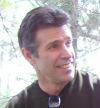 Eric Holt-Giménez Executive Director of Food First/Institute for Food and Development Policy
|
Eric Holt-Giménez, Ph.D. is the Executive Director of Food First/Institute for Food and Development Policy a "peoples' think-and-do tank" dedicated to eliminating the injustices that cause hunger and environmental degradation. Previously, he worked as Latin American Program Manager at the Bank Information Center in Washington, D.C., where he monitored the projects and the policies of the World Bank and the Inter-American Development Bank. He has held positions as a lecturer in International Development and Agroecology at the University of California and Boston University's Global Ecology program. Throughout the 1970s, 1980s and 1990s, Dr. Holt-Giménez lived and worked in Latin America where he helped organize and train farm leaders in agroecology and was a consultant to non-governmental organizations, government ministries, and foreign aid agencies. In his path-breaking participatory research, "Measuring Farmer's Agroecological Resistance to Hurricane Mitch," 2,000 farmers documented the superior sustainability of agroecologically-managed farms to conventional farms in Central America. His first book, "Campesino a Campesino" chronicles nearly thirty years work with Latin America's Farmer to Farmer Movement for sustainable agriculture. In his recent book, "Food Rebellions! Crisis and the Hunger for Justice," co-authored with Raj Patel and Annie Shattuck, Dr. Holt-Giménez proposes equitable, sustainable solutions to the root causes of the global food crisis. He holds a Masters of Science in International Agricultural Development and a Ph.D. in Environmental Studies. |
Friday, April 8, 2011
Dartmouth Latin American, Latino & Caribbean Studies (LALACS) Symposium
"Return to Haiti: Cultural Recovery"
Session I
2:00 – 3:30 PM • Room 41, Haldeman
Human relief effort – Architectural preservation
Dartmouth Haiti Response Team – Henry Jolibois
Session II
4:00 – 6:00 PM • Room 41, Haldeman
Digital Library – Art Preservation – Performance
Brook Wooldridge – Corine Wegener – Gina Ulysse
Cosponsored with Dickey Center for International Understanding, Hood Museum of Art, Baker/Berry Library, Leslie Center for the Humanities, Dartmouth Hitchcock, Center for Health Care Delivery Science, Office of the President, and The Nelson A. Rockefeller Center for Public Policy and the Social Sciences
International, interdisciplinary symposium on the challenge of preserving cultural heritage in the aftermath of the earthquake: architecture, performance, museums, and information networks.
Monday, April 18, 2011

 Sandra Salas
Sandra Salas
Graphic Designer
Founder of “Peace of Art: Design For Changeâ€
“Peace of Art: Mobilizing Art for Justice on the U.S.-Mexico Borderlandâ€
4:00 – 6:00 PM • Room 3, Rockefeller Center
Co-sponsored by the Bildner Program, Dartmouth Asian and Middle Eastern Studies, Dartmouth Women in Business, the John Sloan Dickey Center for International Understanding, Dartmouth Latin American, Latino & Caribbean Studies, the Leslie Center for the Humanities, the Nelson A. Rockefeller Center for Public Policy and the Social Sciences, the William Jewett Tucker Foundation, and Dartmouth Women's and Gender Studies
The El Paso and Cd. Juárez borderland region is one of the largest binational metropolitan areas in the world. The war on drug cartels declared by the Mexican government in 2006 has brought a wave of violence to the region, specifically Cd. Juárez. The violence has gone beyond the cartels and the federal armed forces and now civilians are becoming victims of the violence. There is a sense of impotence among the citizenship. Artists on both sides of the border are raising their voices and demanding justice.
Sandra Salas is a graphic designer in the El Paso and Cd. Juárez borderland region. She has a B.A. in Graphic Design and Mass Media Advertising from the University of Texas at El Paso. With ten years of hands on experience in advertising and graphic design, she owns Creative Gong, an award-winning graphic design firm that focuses on helping small businesses on both sides of the border. Sandra has spent a third of her life on the international bridge, a link between two worlds and truly has absorbed and appreciates the best of both cultures. Her design is influenced by the solutions-oriented American culture and the vibrant, simple and ingenious Mexican way of life. Sandra is founder of “Peace of Art: Design For Change†project and exhibit. Peace of Art is an exhibit that focuses on creating awareness of the situation of violence in the borderland and raising funds to help out victims of the violence.
For more information visit www.peaceofartshow.org
Monday, April 25, 2011
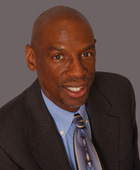 Geoffrey Canada
Geoffrey Canada
Educator and architect of the “Harlem Children’s Zone†and subject of the book Whatever It Takes
"Speaking Out for Children"
4:00 PM • Spaulding Auditorium, The Hopkins Center for the Arts
Supporting the Dartmouth Centers Forum Annual Theme "Speak Out! Listen Up!"
Co-sponsored by the Tucker Foundation, the Bildner Program, the Nelson A. Rockefeller Center, the Dartmouth Education Department, and the Dartmouth Centers Forum
For more information visit https://www.dartmouth.edu/~tucker/
The Dartmouth Centers Forum consists of the following members:
Allwin Initiative for Corporate Citizenship, Collis Center for Student Involvement, Dartmouth Center for the Advancement of Learning (DCAL), Dartmouth College Library, Ethics Institute, Hood Museum of Art, Hopkins Center for the Arts, Institute for Security, Technology, and Society (ISTS), The John Sloan Dickey Center, The Nelson A. Rockefeller Center, Leslie Center for the Humanities, and Tucker Foundation.
For more information visit https://www.dartmouth.edu/~centersforum/
Thursday, April 28, 2011
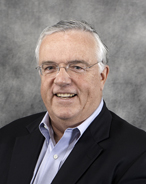
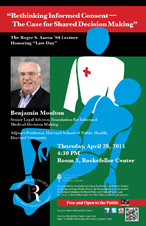 Benjamin Moulton
Benjamin Moulton
Senior Legal Advisor, Foundation for Informed Medical Decision Making
Adjunct Professor, Harvard School of Public Health, Harvard University
“Rethinking Informed Consent – The Case for Shared Decision Makingâ€
4:30 PM • Room 3, Rockefeller Center
The Roger S. Aaron ’64 Lecture – Honoring “Law Dayâ€
Co-sponsored by the Dartmouth Center for Health Care Delivery Science, the Dartmouth Legal Studies Faculty, the Dartmouth Lawyers Association, and the Nelson A. Rockefeller Center for Public Policy and the Social Sciences
Benjamin Moulton has had an extensive career in health care law serving clients in both the private and public sectors. Moulton is the Senior Legal Advisor for the Foundation for Informed Medical Decision Making. Prior to joining the Foundation, Moulton served as legal counsel to George Washington Medical Center, which involved providing legal advice to an academic medical center, a teaching hospital, medical school, and affiliated physicians. Moulton served as the executive director of the American Society of Law, Medicine & Ethics for over 15 years. He holds a teaching appointment as an adjunct professor at the Harvard School of Public Health where he teaches a course on health law in clinical practice within the Department of Health Policy & Management. He received his B.A. from Harvard. In addition he holds a J.D. from Georgetown Law Center and an M.P.H. from Harvard University.
Friday, April 29, 2011
Law Day Panel Discussion I
"The Right to Informed Patient Choice: Its Impact on Cost, Quality, End of Life Care, and Health Law Reform"
2:00 – 3:15 p.m. • Room 1, Rockefeller Center
Co-sponsored by the Dartmouth Center for Health Care Delivery Science, the Dartmouth Legal Studies Faculty, the Dartmouth Lawyers Association, and the Nelson A. Rockefeller Center for Public Policy and the Social Sciences
Moderator:
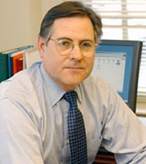 Robert B. Donin, J.D., LL.M.
Robert B. Donin, J.D., LL.M.
General Counsel, Dartmouth College
Robert Donin is General Counsel of Dartmouth College, a position he has held since August, 2000. Previously, he was Deputy General Counsel at Harvard University. Before joining the Harvard legal staff, he was a partner with the Washington, D.C. firm of Verner, Lipfert, Bernhard & McPherson, where he practiced litigation and administrative law. A graduate of Colgate University, Bob received his law degree from the University of Pennsylvania Law School and an LL.M. degree from the University of London, where he was a Fulbright/Hays Scholar.
The Office of the General Counsel is responsible for representing and advising all of Dartmouth's schools, departments and affiliated organizations. As General Counsel, Bob is involved in a broad range of challenging legal issues affecting institutions of higher education, including student affairs, affirmative action, and intellectual property. He is a member of the President's Executive Committee and the Council on Sponsored Activities, among other responsibilities.
Panelists:
|
Dale Collins Vidal, M.D., M.S. Director, Center for Informed Choice at The Dartmouth Institute for Health Policy & Clinical Practice Chief, Plastic Surgery, Dartmouth-Hitchcock Medical Center Professor of Surgery and of Community and Family Medicine, Dartmouth Medical School
|
Dale Collins Vidal, MD, MS is a professor of surgery at Dartmouth Medical School (DMS) and Chief of Plastic Surgery at Dartmouth Hitchcock Medical Center (DHMC). She received her MD degree from Emory University School of Medicine, graduating with honors in 1989. Upon completion of her residency, she joined the Dartmouthâ€Hitchcock Clinic in 1995 and was appointed as Medical Director of the Breast Program in 1999. Under her direction, the care of patients with breast cancer moved from a fragmented system to a coordinated, interdisciplinary process with a single point of contact for patients. Use of computerized screening tools and patient decisionâ€making aids within the program has resulted in greater patient satisfaction and a marked improvement in patients' ability to make an informed choice about treatment options. Dr. Vidal received her introduction to the concepts of shared decisionâ€making and outcomes reporting while a student in the masters program at The Dartmouth Institute for Health Policy and Clinical Practice (TDI). As a leader in healthcare transparency and shared decisionâ€making, Dr. Vidal was named the Director for the Center for Informed Choice in October, 2008. In this role she supports the dissemination of unique, DMS/DH initiated methods into clinical settings and aims to advance shared decisionâ€making in research, education, and practice. She is currently the PI of a multiâ€million dollar, six year initiative to implement and evaluate decision aids across general and specialty clinical care models. Her other area of focus in the realm of collecting patient reported information using web-based systems. Major accomplishments that reflect her leadership and her role as a champion for evidenceâ€based practices & quality improvement include: selected as Fellow in the Executive Leadership in Academic Medicine (ELAM) Program; elected member, Board of Governors, Dartmouth Hitchcock Medical Center and trustee of Dartmouth Hitchcock Clinic and Mary Hitchcock Memorial Hospital; selected as one of six physicians at DH to review and select information systems vendor †a multimillion dollar project for a major multiâ€site hospital network (2007); selected as distinguished visiting professor or the American Society of Plastic Surgeons, 2008; invited speaker at 2010 Institute of Medicine (IOM) 2010 Roundtable on Value and Science-Driven Health Care. |
|
Elliott Fisher, M.D., M.P.H. Director, Center for Population Health, The Dartmouth Institute for Health Policy and Clinical Practice James W. Squires Professor of Medicine and Community and Family Medicine, Dartmouth Medical School |
Dr. Elliott Fisher's research focuses on the causes, consequences and implications of variations in health system performance. Fisher's current work focuses on advancing the use of patient-reported measures as tools for improvement and accountability, and the development, pilot testing and evaluation of new models of health care delivery and payment.
|
|
Senior Legal Advisor, Foundation for Informed Decision Making Adjunct Professor, Harvard School of Public Health, Harvard University |
Benjamin Moulton has had an extensive career in health care law serving clients in both the private and public sectors. Moulton is the Senior Legal Advisor for the Foundation for Informed Medical Decision Making. Prior to joining the Foundation, Moulton served as legal counsel to George Washington Medical Center, which involved providing legal advice to an academic medical center, a teaching hospital, medical school, and affiliated physicians. Moulton served as the executive director of the American Society of Law, Medicine & Ethics for over 15 years. He holds a teaching appointment as an adjunct professor at the Harvard School of Public Health where he teaches a course on health law in clinical practice within the Department of Health Policy & Management. He received his B.A. from Harvard. In addition he holds a J.D. from Georgetown Law Center and an M.P.H. from Harvard University. |
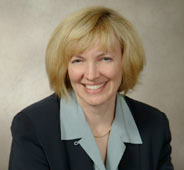
Lisa Snow Wade (D'85), J.D. |
Lisa specializes in advising health care organizations on a variety of daily legal questions including Medicare/Medicaid, Stark and Fraud/Abuse compliance, EMTALA, HIPAA, quality assurance, and consent issues. She also is an experienced litigator, having tried cases to verdict in both state and federal courts. |
“Should You Go to Law School?†– Career Panel Discussion
3:30 – 4:45 p.m. • Room 1, Rockefeller Center
Co-sponsored by the Dartmouth Center for Health Care Delivery Science, the Dartmouth Legal Studies Faculty, the Dartmouth Lawyers Association, and the Nelson A. Rockefeller Center for Public Policy and the Social Sciences
Moderator: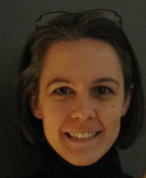 Alexandra Meise Bay (D'01), J.D.
Alexandra Meise Bay (D'01), J.D.
Judicial Clerk for the Hon. Jeffrey R. Howard, First Circuit Court of Appeals
Alexandra Meise Bay is currently a judicial clerk on the First Circuit Court of Appeals and an Adjunct Professor at Vermont Law School, where she teaches International Commercial Arbitration. She specializes in international dispute resolution, including matters of transitional justice and treaty disputes. Immediately prior to clerking, Meise Bay was an Associate in the International Arbitration and Sovereign Litigation practice groups at White & Case LLP. She has also worked in the field of international political development in countries such as Yemen, Albania, Bosnia-Herzegovina, and Macedonia, and in the international criminal law for the war crimes tribunals in Timor Leste and Cambodia. She is a Vice President of the Dartmouth Lawyers Association.
Meise Bay received her A.B. from Dartmouth in Religion in 2001. While at Dartmouth she was active in DTV and Dartmouth Broadcasting, and she served as a Senior Interviewer in the Office of Admissions. Following graduation, she used a Fulbright Fellowship to photo-document the resurgence of religious life in Albania post-communism. From there she moved into a career in international political development, which led her to pursue a J.D. at Georgetown University Law Center. She also holds an M.P.A. from Columbia University's School of International and Public Affairs.
Panelists:
|
Heather McMillan Nakai (D'02), J.D. |
Heather L. McMillan Nakai is an enrolled member of the Lumbee Tribe of North Carolina and a member of the Dartmouth College Class of 2002. McMillan Nakai is currently a Staff Attorney at the National Indian Gaming Commission where she serves as the counsel for the Phoenix Region. Prior to joining the staff at the NIGC, McMillan Nakai worked as policy analyst in the Division of Regulatory and Legal Affairs at the Indian Health Service and as the subject matter expert on eligibility for the Director of the IHS. She has clerked for the Kalispel Tribe in Washington State, the Forest County Potawatomi Tribe in Wisconsin, and the San Manuel Band of Mission Indian in Southern California. McMillan Nakai received her A.B. from Dartmouth College in History and Native American Studies. Immediately following her graduation form Dartmouth, McMillan Nakai began law school at the University of California at Los Angeles with a concentration in Indian law and corporate law. She received her J.D. in 2005 and is licensed to practice in the state of North Carolina. McMillan Nakai currently serves as the Treasurer of the Washington D.C. Native American Bar Association.
|
|
|
Benjamin Moulton has had an extensive career in health care law serving clients in both the private and public sectors. Moulton is the Senior Legal Advisor for the Foundation for Informed Medical Decision Making. Prior to joining the Foundation, Moulton served as legal counsel to George Washington Medical Center, which involved providing legal advice to an academic medical center, a teaching hospital, medical school, and affiliated physicians. Moulton served as the executive director of the American Society of Law, Medicine & Ethics for over 15 years. He holds a teaching appointment as an adjunct professor at the Harvard School of Public Health where he teaches a course on health law in clinical practice within the Department of Health Policy & Management. He received his B.A. from Harvard. In addition he holds a J.D. from Georgetown Law Center and an M.P.H. from Harvard University. |
|
|
Lisa specializes in advising health care organizations on a variety of daily legal questions including Medicare/Medicaid, Stark and Fraud/Abuse compliance, EMTALA, HIPAA, quality assurance, and consent issues. She also is an experienced litigator, having tried cases to verdict in both state and federal courts. |
Friday, April 29, 2011
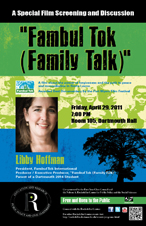
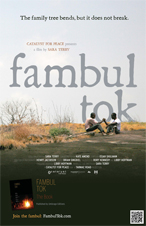 Libby Hoffman
Libby Hoffman
President, Fambul Tok International
Executive Producer, "Fambul Tok (Family Talk)"
Parent of a Dartmouth 2014
A Special Film Presentation
"Fambul Tok (Family Talk): Path to Peace and Reconciliation in Sierra Leone"
Awarded Best Documentary by Fort Myers Film Festival
7:00 PM • Room 105, Dartmouth Hall
Co-sponsored by the First Year Class Council and the Nelson A. Rockefeller Center for Public Policy and the Social Sciences
For more information please visit http://www.facebook.com/FambulTok
For more information visit http://rockefeller.dartmouth.edu/events/programs.html
Victims and perpetrators of Sierra Leone’s brutal civil war come together for the first time in an unprecedented program of tradition-based truth-telling and forgiveness ceremonies. Through reviving their ancient practice of fambul tok (family talk), Sierra Leoneans are building sustainable peace at the grass-roots level – succeeding where the international community’s post-conflict efforts failed. Filled with lessons for the West, this film explores the depths of a culture that believes that true justice lies in redemption and healing for individuals – and that forgiveness is the surest path to restoring dignity and building strong communities.
Monday, May 2, 2011

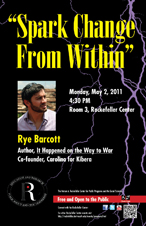 Rye Barcott
Rye Barcott
Author, "It Happened on the Way to War:
Co-founder, Carolina for Kibera
"Spark Change From Within"
4:30 PM • Room 3, Rockefeller Center
The Nelson A. Rockefeller Center for Public Policy and the Social Sciences
Rye Barcott’s riveting presentation on social entrepreneurship takes audiences on a journey through the joy and heartbreak, the friendships and betrayals, and the failures and triumphs of creating a movement to spark change from within one of the world's largest and most volatile slums. As inspiring as it is informative, this presentation will spur you on your own quest to make a difference in the world, no matter your age or avocation.
Rye Barcott co-founded the non-governmental organization Carolina for Kibera (CFK) with Salim Mohamed and Tabitha Atieno Festo while he was an undergraduate at the University of North Carolina at Chapel Hill earning his B.A. in Peace, War, and Defense. CFK invests in local leaders in the Kibera slum of Nairobi, Kenya through its model of participatory development. After graduation, Barcott served in the U.S. Marine Corps for 5 years in Iraq, Bosnia, and the Horn of Africa. He then earned master’s degrees in business and public administration from Harvard University, where he was a Reynolds Social Entrepreneurship Fellow and a member of the Harvard Endowment's Advisory Committee on Shareholder Responsibility. In 2006, ABC World News named then Captain Barcott a ‘Person of the Year’ for his dual service to Kibera and the Marine Corps. In 2009, he joined the inaugural class of TED Fellows, and in 2011 was named one of the World Economic Forum's 'Young Global Leaders' of 2011. He lives in North Carolina with his wife and daughter and works in the Sustainability Office at Duke Energy.
Thursday, May 5, 2011
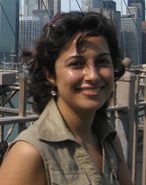
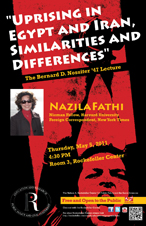 Nazila Fathi
Nazila Fathi
Nieman Fellow, Harvard University
Foreign Correspondent, New York Times
"Uprising in Egypt and Iran, Similarities and Differences"
4:30 PM • Room 3, Rockefeller Center
The Bernard D. Nossiter ’47 Lecture
The Nelson A. Rockefeller Center for Public Policy and the Social Sciences
Iran and Egypt are two major countries in the Middle East and political change in either of these countries has had ramifications in the region. But what were the similarities and differences between the uprising in Iran in 2009 and Egypt in 2011? Why over six months of protest in Iran did not lead to any change while protestors in Egypt forced Mubarak to leave in less than a month?
Monday, May 9, 2011
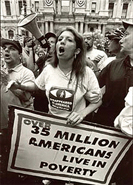 Cheri Honkala
Cheri Honkala
Founder of the Kensington Welfare Rights Union (KWRU)
"Leadership, Activism, and Economic Human Rights"
5:00 PM • Top of the Hop
Organized by the Rockefeller Leadership Fellows
The Nelson A. Rockefeller Center for Public Policy and the Social Sciences
Cheri Honkala was a single mother collecting public assistance in Philadelphia when she founded the Kensington Welfare Rights Union (KWRU). After speaking with other mothers in her situation around North Philadelphia, she realized there was a need for community support and raising awareness on issues related to homelessness, affordable housing, and most importantly economic human rights. The KWRU was Honkala's effort to join the historic legacy of activists who have attempted to mobilize a mass movement by poor people in the United States so that they might make use of the political power they have by virtue of being US citizens.
This discussion will focus on Honkala's struggles as a leader in under-resourced conditions. As an organizer for welfare rights in the 1990s, Honkala was combating broad based political and social forces that had been coalescing since FDR first wrote federal welfare into law. By 1991, when she founded the organization, almost all of society had agreed it was time to "end welfare as we know it." Honkala will also discuss her emphasis on economic human rights as the foundational motivation for this movement, focusing primarily on the ways in which she attempted to add this concept of rights to the larger US consciousness of citizenship entitlements.
Friday, May 13, 2011
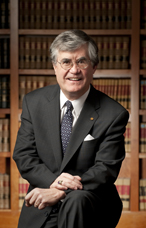
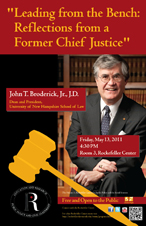 John T. Broderick, Jr.
John T. Broderick, Jr.
Dean and President, University of New Hampshire School of Law
"Leading from the Bench: Reflections from a Former Chief Justice"
Friday, May 13, 2011
4:30 PM • Room 3, Rockefeller Center
The Nelson A. Rockefeller Center for Public Policy and the Social Sciences
John Broderick will examine the skills and aptitudes required of leaders. He will draw upon his personal experience and observation in his years in service as Chief Justice of the New Hampshire Supreme Court.
John T. Broderick, Jr. graduated Magna Cum Laude from Holy Cross in 1969 and he received his J.D. at the University of Virginia Law School in 1972. He was a trial lawyer for 22 years. He is a Fellow of the American College of Trial Lawyers, former President of the New Hampshire Bar Association and the New Hampshire Trial Lawyers Association. Broderick was appointed to the Supreme Court in 1995 by Governor Merrill and was appointed in 2004 by Governor Benson to Chief Justice. He left the court in November 2010 and became the Dean and President of the University of New Hampshire School of Law in January 2011.
Wednesday, May 18, 2011
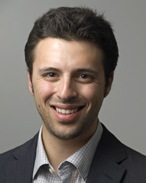 Ezra Klein
Ezra Klein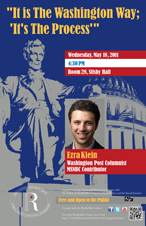
Washington Post Columnist
MSNBC Contributor
"It is the Washington Way: 'It’s The Process'"
4:30 PM • Room 28, Silsby Hall
The Nelson A. Rockefeller Center for Public Policy and the Social Sciences
It is rare to hear anyone compliment how Washington works, or what it ends up doing. But those criticisms are frequently tethered to an inaccurate understanding on how Washington functions -- if only the president would give a big speech, or show some backbone, it would all change. That’s not true. To understand why Washington works poorly you have to understand how it works. You have to understand the process.
Ezra Klein is a columnist at the Washington Post and Newsweek, as well as a contributor to MSNBC. His work focuses on domestic and economic policymaking, as well as the political system that’s constantly screwing it up. He has appeared on The Rachel Maddow Show, Charlie Rose, Real Time with Bill Maher, The McLaughlin Report, The Colbert Report, and more.
Tuesday, May 24, 2011
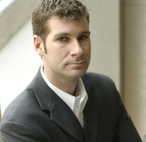 P. W. Singer
P. W. Singer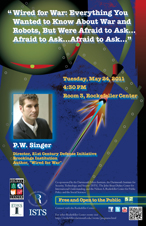
Director of 21st Century Defense Initiative
Author of "Wired for War"
"Wired for War: Everything You Wanted to Know About War and Robots, But Were Afraid to Ask…Afraid to Ask…Afraid to Ask…"
4:30 PM • Room 3, Rockefeller Hall
Co-sponsored by the Dartmouth Ethics Institute, the Dartmouth Institute for Security Technology, and Society, The John Sloan Dickey Center for International Understanding, and The Nelson A. Rockefeller Center for Public Policy and the Social Sciences
What happens when science fiction becomes battlefield reality?
An amazing revolution is taking place on the battlefield, starting to change not just how wars are fought, but also the politics, economics, laws, and ethics that surround war itself. This upheaval is already afoot -- remote-controlled drones take out terrorists in Afghanistan, while the number of unmanned systems on the ground has gone from zero to 12,000 over the last five years. But it is only the start. What are the political, military, legal, and moral questions that we have to figure out, as we begin to hand over more and more of warfighting to our machines?
Peter Warren Singer is Senior Fellow and Director of the 21st Century Defense Initiative at the Brookings Institution. He is the author of 3 award-winning books on the topics of private military firms, child soldiers and most recently his New York Times bestseller Wired for War: the Robotics Revolution and Conflict in the 21st Century. Singer has consulted for groups that range from the Pentagon and FBI to Universal Studios and the Call of Duty video game franchise. In his personal capacity, Singer served as coordinator of the Obama-08 campaign’s defense policy task force. In 2009, Singer was named by Foreign Policy Magazine to the Top 100 Global Thinkers List, of the people whose ideas most influenced the world that year.
Winter 2011 Rockefeller Center Public Programs
Wednesday, January 12, 2011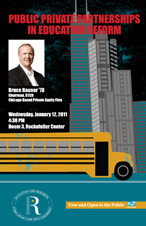 - CANCELLED DUE TO WEATHER
- CANCELLED DUE TO WEATHER
 Bruce Rauner, '78
Bruce Rauner, '78
Chairman, GTCR – Chicago Based Private Equity Firm
"Public Private Partnerships in Education Reform"
4:30 PM • Room 3, Rockefeller Center
Public education reform is a challenge confronting all major cities. Successful reform efforts typically engage the private sector in addition to parents, teachers, school administrators, and elected officials. Drawing on his extensive involvement in educational philanthropy in Chicago, Bruce Rauner will discuss the reform strategies that have worked and the problems that remain.
Bruce Rauner joined GTCR in 1981. He holds an MBA from Harvard Business School and a BA from Dartmouth College summa cum laude, with highest distinction in Economics. Rauner’s leadership role has been instrumental in many successful GTCR investments including Gensar, Polypore, CoreStaff, Answerthink, American Medical Labs and AppNet.
Rauner continues to be very committed to helping others succeed. He serves on the board of the Renaissance Schools Fund, Ravinia Music Festival and the Metropolitan Pier and Exposition Authority. He is a member of the President’s Councils for both Dartmouth College and Harvard Business School. Rauner is Chairman of the Education Committee of the Civic Committee of the Commercial Club of Chicago and past Chairman of the Chicago Public Education Fund. He was the principal donor for Chicago projects including the new Red Cross regional headquarters, a YMCA in the Little Village neighborhood, four new charter high schools on the near west side, and the Stanley C. Golder Center for Private Equity and Entrepreneurial Finance at the University of Illinois. Rauner works with the Nature Conservancy and Montana Land Reliance to preserve ranch land and wildlife habitat in Montana and received the Murie-Broome Award from The Wilderness Society for outstanding work in wilderness preservation.
Monday, January 17, 2011
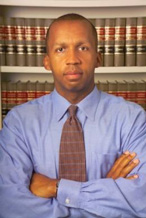 Bryan Stevenson
Bryan Stevenson
Founder and Executive Director of the Equal Justice Initiative
With remarks by President Jim Yong Kim and Catianne Ngante ’11, President of the Afro-American Society
7:00 PM • Moore Theater, Hopkins Center for the Arts
Supporting the Martin Luther King, Jr. Celebration Annual Theme "Injustice Anywhere is a Threat to Justice Everywhere"
Bryan Stevenson, Founder and Executive Director of the Equal Justice Initiative, has won national acclaim for his work challenging bias against the poor and people of color in the criminal justice system. Since graduating from Harvard Law School and the Harvard School of Government, he has assisted in securing relief for dozens of condemned prisoners, advocated for poor people, and developed community-based reform litigation aimed at improving the administration of criminal justice. He also is on the law faculty at New York University School of Law.
Free tickets available at the Hopkins Center Box office beginning Jan. 11 at noon for those with Dartmouth student, faculty, or staff I.D.; beginning Jan. 13 at 10 a.m. for the general public. Four-ticket limit per person. Ticket holders must be in their seats by 6:45 p.m., after which empty seats become available to those without tickets.
Visit https://www.dartmouth.edu/~mlk for more information about Dartmouth College’s Celebration of Martin Luther King, Jr.
Wednesday, January 19, 2011 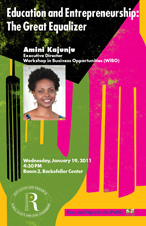
 Amini Kajunju
Amini Kajunju
Executive Director
Workshop in Business Opportunities (WIBO)
"Education and Entrepreneurship: The Great Equalizer"
4:30 PM • Room 3, Rockefeller Center
Lecture funded by a generous contribution from The Portman Entrepreneurial Leadership Fund.
The Portman Entrepreneurial Leadership Fund was established in 2004 by William C. Portman '45 T '47, together with Robert J. Portman '78; William C. Portman III T'81; and Virginia Portman Amis. The fund is designed to "...foster an understanding and appreciation of small business development, entrepreneurial activity and risk-taking, and the role that public policy plays in shaping its course."
Supporting the Martin Luther King, Jr. Celebration Annual Theme "Injustice Anywhere is a Threat to Justice Everywhere"
Visit https://www.dartmouth.edu/~mlk for more information about Dartmouth College’s Celebration of Martin Luther King, Jr.
The circumstances in which we are born and raised can define who we become. Is there something that we can do as a society to level the playing field? Could education and entrepreneurship be the mechanism to make the world a fairer place? Let's talk about it.
Amini Kajunju has been executive director of the Workshop in Business Opportunities (WIBO) since July 2002. Kajunju first joined WIBO in August 2001 as associate executive director. In that role, Kajunju developed strategic and fund-raising plans while working with the staff and board on curriculum development and marketing strategies for WIBO.
As executive director, Kajunju has heightened the profile of one of the oldest, comprehensive, and highly respected entrepreneurial programs in the nation. With over 100 business owners as volunteers conducting 288 sessions, Kajunju and her team train, educate and inspire 500 enrollees of the workshop per year. WIBO’s flagship 16-week workshop, “
"How to Build a Growing Profitable Business" is currently conducted in nine underserved communities of New York City. WIBO provides a myriad of other services including business advisory services, legal and accounting clinics, free business directory, monthly seminars, networking events, and other business support activities. WIBO now conducts introduction to business workshops in correctional facilities through New York City. In total, WIBO serves 1500 entrepreneurs a year.
Praised as a mini-MBA workshop for the working person, Kajunju has enhanced WIBO's flagship workshop by incorporating new knowledge and realities in marketing and sales, personal finance, and human resources. Under Kajunju's leadership, WIBO has seen a 50% increase in corporate and foundation funding. Some of her accomplishments include forging new partnerships with community leaders and organizations to maximize WIBO's impact and creating a more professional internal infrastructure. Additionally, WIBO is providing meaningful support to its entrepreneurs at any stage of business. As a result of Kajunju's emphasis on strategic expansion and solid services management, an increased number of entrepreneurs are using WIBO to help grow their businesses.
Prior to WIBO, Kajunju served as a program manager at the International Executive Service Corps (IESC), an all-volunteer organization providing free consulting services to businesses in developing countries. At IESC, Kajunju recruited and managed volunteers who assisted small to medium businesses in the fisheries, clothing, and mining industries in Southern Africa.
Most recent professional activities and accolades include a judge for the Brooklyn Public Library PowerUP! Business Plan Competition and the New York City Commission on Women's Issues Small Business Award. She is often asked to speak on panels on issues concerning small businesses. She is the recipient of the Network Journal Magazine’s "40 Under 40" Achievement Award. She is on the Executive Committee of AngelAfrica. AngelAfrica is a network of professionals who believe that the economy of Africa will be improved by a thriving private sector. Finally, Kajunju was the team leader for the William H. Clinton Foundation Small Business Initiatives.
She holds a Bachelors of Arts degree in International Relations with an emphasis on economic development from Brigham Young University and a Masters degree in Public Administration with a concentration in finance and management from New York University. Kajunju has received a diploma in credit analysis from NYU School of Continuing Education and Professional Studies.
Wednesday, January 26, 2011
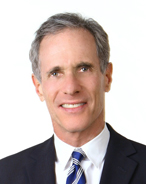 Fred Karger
Fred Karger
Presidential Exploratory Committee
President, Rights Equal Rights
“Where Have All the Moderates Gone?"
4:00 PM • The Class of 1930 Room, Rockefeller Center
Co-sponsored by the Dartmouth College Republicans and the Rockefeller Center
"Republican Political Consultant," "The Most Radical Gay Rights Activist,†“Reagan Aide," "GOP’s Top Dark-Arts Operator," Fred Karger has been called many things during his 40 years in politics, but he’s still adjusting to his new label: “Possible Presidential Candidate.â€
Last year, Fred Karger formed a Presidential Exploratory Committee to explore the possibility of running for President in the Republican presidential primary. If he does, Fred would make history as the first openly gay candidate to run for president and the only moderate to enter the Republican Primary. Fred has been strengthened by his fifteen trips to Iowa and New Hampshire, the excitement of voters to hear his independent voice in the primary season, and the scores of national press that are reporting his efforts.
Fred has worked on nine presidential campaigns, four of which in a senior capacity, Ford’s campaign, Reagan’s two campaigns, and George H.W. Bush’s campaign. Upon retirement, Fred redirected his political skills to become a gay activist, helping to convict the Mormon Church of 13 counts of elections fraud for their involvement with Proposition 8 campaign and filing the complaint which has lead to an investigation of the National Organization for Marriage in Maine.
Monday, February 7, 2011 - POSTPONED, New Date To Be Announced
 Geoffrey Canada
Geoffrey Canada
Educator and architect of the “Harlem Children’s Zone†and subject of the book Whatever It Takes
"Speaking Out for Children"
4:00 PM • Spaulding Auditorium, The Hopkins Center for the Arts
Supporting the Dartmouth Centers Forum Annual Theme "Speak Out! Listen Up!"
Co-sponsored by the Tucker Foundation, the Bildner Program, the Rockefeller Center, the Education Department, and the Dartmouth Centers Forum
The Dartmouth Centers Forum consists of the following members:
Allwin Initiative for Corporate Citizenship, Collis Center for Student Involvement, Dartmouth Center for the Advancement of Learning (DCAL), Dartmouth College Library, Ethics Institute, Hood Museum of Art, Hopkins Center for the Arts, Institute for Security, Technology, and Society (ISTS), The John Sloan Dickey Center, The Nelson A. Rockefeller Center, Leslie Center for the Humanities, and Tucker Foundation.
For more information go to https://www.dartmouth.edu/~centersforum/
Thursday, February 17, 2011
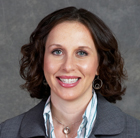 Bethany Rubin Henderson
Bethany Rubin Henderson
Founder and Executive Director
City Hall Fellows
"Engaging Millennials in Governing Cities."
4:30 PM • Room 3, Rockefeller Center
With the increasing burdens placed upon them, local governments need top talent now more than ever. Yet, the municipal workforce is rapidly aging into retirement and few young people are stepping up. Bethany looks at why this happened and what can be done about it.
Bethany Rubin Henderson is the Founder and Executive Director of City Hall Fellows (www.cityhallfellows.org), the only non-partisan national service corps preparing the best and brightest to lead America's cities. Working in New York City government as an NYC Urban Fellow over a decade ago inspired Bethany to find a way to engage more young people in local public service. Since launching City Hall Fellows three years ago, Bethany has raised over $2,000,000 from public and private sources to train 51 Fellows in San Francisco, Houston and Baton Rouge. Previously, Bethany was a trial lawyer at Quinn Emanuel, the largest litigation-only firm in the country.
Bethany has authored eight journal articles on topics ranging from cities' human capital needs to intellectual property law. Bethany holds a J.D. from Harvard Law School and both a B.A. and M.A. in Political Science (summa cum laude and Phi Beta Kappa) from the University of Pennsylvania. She is a 2009 Echoing Green Fellow, a 2010 New Leaders Council Fellow and a member of the 2011 Selah Executive Leadership Program Cohort. Next American City Magazine named Bethany a member of their 30-person 2010 Next American Vanguard.
Monday, February 21, 2011
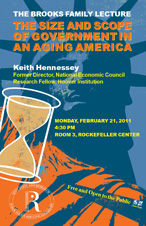 Keith Hennessey
Keith Hennessey
Former Director, National Economic Council
Research Fellow, Hoover Institution
Stanford University
"The Size and Scope of Government in an Aging America."
4:30 PM • Room 3, Rockefeller Center
The Brooks Family Lecture
Keith Hennessey is a Research Fellow at the Hoover Institution at Stanford University. He teaches as a lecturer at Stanford Business School and Stanford Law School. He serves as a member of the Financial Crisis Inquiry Commission, a bipartisan commission created by Congress to examine the causes, domestic and global, of the current economic and financial crisis in the United States. He writes about American economic policy on his blog, KeithHennessey.com, named one of the 25 best economics blogs by The Wall Street Journal.
Hennessey served as the senior White House economic advisor to President George W. Bush. He coordinated economic policy for the President, including financial market issues, tax policy, energy and climate change, health care, Social Security and Medicare reform, housing, technology and telecommunications, and agriculture. From August 2002 through the end of 2007, Hennessey served as Deputy Assistant to the President for Economic Policy and Deputy Director of the National Economic Council. During the financial crisis of 2008 he was Assistant to the President for Economic Policy and Director of the National Economic Council.
Before working in the White House Hennessey spent eight years on Capitol Hill, most of it working as Economic Policy Advisor to Senate Majority Leader Trent Lott (R-MS). He also worked for Senator Pete Domenici (R-NM) on the staff of the Senate Budget Committee, and on the staff of the 1994 Bipartisan Commission on Entitlement and Tax Reform.
Before coming to Washington in 1994, he spent two years developing software at Symantec Corporation and two years at Harvard where he earned a Master in Public Policy degree from the John F. Kennedy School of Government. He earned a BAS degree in math and political science from Stanford in 1990. Hennessey lives in Palo Alto, California and wishes he had a dog.
Wednesday, March 2, 2011
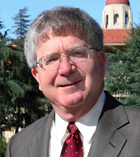 Michael McConnell
Michael McConnell
Richard and Frances Mallery Professor of Law
Director, Stanford Constitutional Law Center
Senior Fellow, Hoover Institution
Stanford University
"Whatever Happened to Freedom of Association?"
4:30 PM • Room 3, Rockefeller Center
The Stephen R. Volk '57 Lecture
Co-sponsored with the Dartmouth Legal Studies Faculty Group and the Dartmouth Lawyers Association
Until recently, the freedom of groups to form around shared beliefs was at the heart of the First Amendment. Now the right has fallen on hard times. Most recently, a 5-4 majority of the Supreme Court held that a public university could require a religious student group to allow hostile outsiders to vote in its elections and lead its meetings. This lecture explores the changes in legal attitudes that have produced this change, and ideas about how to revive the freedom of association, which Tocqueville described as "a necessary guarantee against the tyranny of the majority."
Michael W. McConnell is the Richard & Frances Mallery Professor and Director of the Constitutional Law Center at Stanford Law School, as well as Senior Fellow at the Hoover Institution. He is a leading authority on freedom of speech and religion, the relation of individual rights to government structure, originalism, and various other aspects of constitutional history and constitutional law. He is author of numerous articles and co-author of two casebooks: The Constitution of the United States (Foundation Press) and Religion and the Constitution (Aspen). He is co-editor of Christian Perspectives On Legal Thought (Yale Univ. Press).
Professor McConnell brings wide practical experience to bear on his teaching and scholarship. Before joining Stanford in 2009, he served as a Circuit Judge on the U.S. Court of Appeals for the Tenth Circuit. He is the only full-time professor of law in the nation who has previously served as a federal appellate judge. He has argued 13 cases in the United States Supreme Court, most recently Christian Legal Society v. Martinez, in 2010. Before his appointment to the bench, McConnell was Presidential Professor of Law at the S.J. Quinney College of Law at the University of Utah, and prior to that the William B. Graham Professor of Law at the University of Chicago Law School. He has taught six times as a visiting professor at Harvard Law School. He served as law clerk to then Chief Judge J. Skelly Wright of the U.S. Court of Appeals for the District of Columbia Circuit, and to Justice William J. Brennan Jr. of the U.S. Supreme Court. McConnell was an assistant general counsel at the Office of Management and Budget, an assistant to the Solicitor General in the Department of Justice under President Ronald Reagan, and a member of the President’s Intelligence Oversight Board from 1988-1990.
Sunday, March 6, 2011
TEDx Dartmouth 2011
11:30 AM - 4:30 PM • Spaulding Auditorium
TEDxDartmouth, an officially licensed TED event, features "Ideas Worth Spreading" in a one-day conference format during which innovative professors, students, and alumni from across the Dartmouth community share exciting ideas. Dartmouth students, staff, administration and alumni, as well as members of the Upper Valley community will come to Spaulding Auditorium to hear our speakers’ 18-minute talks centered on the 2011 theme, "You Might Not Realize." During our catered break we will mingle with each other and the speakers themselves to further discuss the stimulating ideas. We seek to spread great ideas, represent Dartmouth's richness to the world, and bring people together.
To sign up or for more information, please go to the TEDxDartmouth web site.
| Speaker Name | Position | Organization/Department |
| Annette Gordon-Reed '81 | Trustee | Harvard Law School |
| Bill Helman '81 | Trustee | Greylock Partners |
| Joseph Helble | Professor/Dean | Thayer School of Engineering |
| Thalia Wheatley | Professor | Psychology |
| Richard D'Aveni | Professor | Tuck School of Business |
| Hany Farid | Professor | Computer Science |
| Tim Pulju | Professor | Linguistics |
| Michael Chaney | Professor | English |
| Ben Valentino | Professor | Government |
| Al Mulley | Director |
Center for Healthcare Delivery Service |
| Harry Enten '11 | Student | Government |
| Anise Vance '11 | Student | Senior Fellow Major |
| Bobby Esnard '14 | Student | Performance Major |
| Alex Arnold '14 | Student | Performance Major |
Fall 2010 Rockefeller Center Public Programs
Wednesday, September 29, 2010
Article about the event from the September 30, 2010 Dartmouth
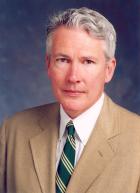 Philip Bobbitt
Philip Bobbitt
Herbert Wechsler Professor of Jurisprudence at Columbia University
"Can The U.S. Have A 'War' On Terror? Can We Win It?"
4:30 PM • Room 3, Rockefeller Center
Constitution Day Lecture
Distinguished Senior Lecturer, Ph.D. Oxford, J.D. Yale, A.B. Princeton. One of the nation's leading constitutional theorists, Professor Bobbitt’s interests include not only constitutional law but also international security and the history of strategy. He has published six books: Tragic Choices (with Calabresi) (1978), Constitutional Fate (1982), Democracy and Deterrence (1987), U.S. Nuclear Strategy (with Freedman and Treverton) (1989), Constitutional Interpretation (1991), The Shield of Achilles: War, Peace and the Course of History (Knopf, 2002) and, most recently, Terror and Consent: The Wars for the Twenty-First Century (Knopf, 2008).
Bobbitt is a Fellow of the American Academy of Arts and Sciences. He is also a Fellow of the Club of Madrid. He is a Life Member of the American Law Institute, and a member of the Council on Foreign Relations, the Pacific Council on International Policy, the International Institute for Strategic Studies and the Executive Council of the American Society of International Law. He is a member of the Commission on the Continuity of Government. He has served as Law Clerk to the Hon. Henry J. Friendly (2 Cir.), Associate Counsel to the President, the Counselor on International Law at the State Department, Legal Counsel to the Senate Iran-Contra Committee, and Director for Intelligence, Senior Director for Critical Infrastructure and Senior Director for Strategic Planning at the National Security Council. He is a former trustee of Princeton University; and a former member of the Oxford University Modern History Faculty and the War Studies Department of Kings College, London. He serves on the Editorial Board of Biosecurity and Bioterrorism. For the fall term 2005, he was the James Barr Ames Visiting Professor of Law at Harvard Law School. For the spring term 2007, he was the Samuel Rubin Visiting Professor of Law at Columbia Law School. Formerly the A.W. Walker Centennial Chair at the Law School, Professor Bobbitt now holds a chair at the Columbia Law School, though he remains a Senior Fellow in the Robert S. Strauss Center for International Security and Law at the University of Texas.
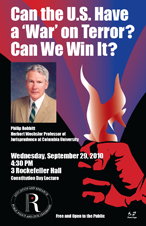
Tuesday, October 5, 2010
Article about the event in the October 6, 2010 Dartmouth
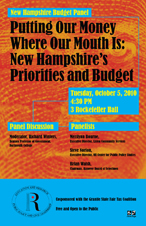 New Hampshire Budget Panel
New Hampshire Budget Panel
"Putting Our Money Where Our Mouth Is: New Hampshire's Priorities and Budget" Panel Discussion
Tuesday, October 5, 2010
4:30 PM • Room 3, Rockefeller Center
Cosponsored with the Granite State Fair Tax Coalition
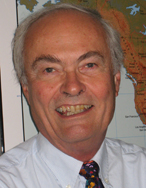 Moderator, Richard Winters, Remsen Professor of Government, Dartmouth College
Moderator, Richard Winters, Remsen Professor of Government, Dartmouth College
Richard F. Winters is the William Clinton Story Remsen Class of 1943 Professor of Government at Dartmouth. Winters received his B.A. from Southern Illinois University in Carbondale, his M.A. for the University of Hawaii, and his 1972 Ph.D. from Stanford University.
Professor Winters was hired as an Instructor of Government at Dartmouth College in 1969 and has been on the faculty since that time. He served as chair of the Department of Government at Dartmouth in 1982, again from 1989-1991, and a third term from July of 1999 until July of 2002. From 1986 to 1989, Winters served as Acting Director and Director of the Nelson A. Rockefeller Center for the Social Sciences at Dartmouth. He has served on several committees of the American Political Science Association. He also served a term as president of the section on State Politics and Policy, one of thirty organized sections of the American Political Science Association.
Professor Winters’ special fields of interest are American state politics, American political economy, social welfare politics, and the politics of the budgetary process. He is co-author of How America Is Ruled and his articles have appeared in various books of collected readings, the American Political Science Review, the American Journal of Political Science, American Politics Quarterly, Journal of Politics, and Polity.
Panelists:
Merilynn Bourne, Executive Director, Listen Community Services. 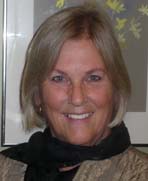
Merilynn Bourne has been the Executive Director of Listen Community Services since 2000. Listen is a private non-profit service agency located in Lebanon, NH. Listen provides services and support to meet the critical needs of Upper Valley NH &; VT individuals and families. Programs include rent and fuel assistance, Community Dinners, food pantry, budget counseling, teen life skills counseling and summer camp scholarships. Listen operates 4 area thrift stores which provide the agency with 80% of its annual funding needs.
Merilynn is a founding board member of MORE THAN WHEELS, a non-profit car loan and counseling agency and she is a member of the Upper Valley Nonprofit Roundtable. She served 4 years on the advisory board of The Allwin Initiative for Corporate Citizenship at the Tuck School and was a board member for Twin Pines Housing Trust.
Merilynn has lived in Cornish, NH since 1971 and served as Selectwoman from 2004 to 2010. She has also served on the Cornish Planning Board, PTO and Fair Association. Three of her four children live here in the Upper Valley with their families.
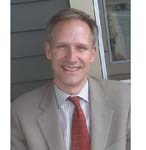 Steve Norton, Executive Director, NH Center for Public Policy Studies
Steve Norton, Executive Director, NH Center for Public Policy Studies
Steve Norton is the Executive Director of the New Hampshire Center for Public Policy Studies, a private non-profit think-tank providing an unbiased source of fact-based information helping define major policy issues and offering innovative approaches to support resolution of those issues. The Center focuses on a variety of topics including state revenues and expenditures, corrections policy, health care finance, education quality and finance, data access and quality, local government finance, and data access and quality.
Prior to his current work, Steve focused much of his career on studying and managing the provision of social services. Between 1998 and 2005, Steve worked for the New Hampshire Department of Health and Human Services in a variety of capacities, including as director of the State’s Medicaid program from 2003-2005. From 1990 to 1998, Steve worked as a Research Associate at the Urban Institute in Washington DC where he conducted health services research and published extensively on a variety of topics.
Steve lives in Concord, NH with his wife and their two children. He is an amateur triathlete and has coached high school Nordic skiing. He currently serves on the Concord Zoning Board, and on the Boards of the Maine Health Information Center, the NH Center for Non-Profits, and on the advisory council for the New England Public Policy Center.
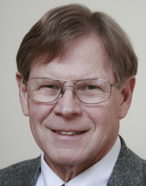 Brian Walsh, Chairman, Hanover Board of Selectmen
Brian Walsh, Chairman, Hanover Board of Selectmen
Mr. Walsh is Chairman of the Board of Selectmen in Hanover, New Hampshire and a Director of the New Hampshire Center for Public Policy Studies. Previously, he was a founder and original CEO of three successful technology start-ups. He has also served on the Planning Board in Hanover, and numerous boards of private companies. Currently, Brian is Director of Americans for Campaign Reform and on the Advisory Board of the Upper Valley Region of the New Hampshire Charitable Foundation. As an artist, through his watercolor paintings, Brian seeks to portray the beauty of our earth’s special times and places: ten percent of the proceeds from the sale of his works is donated to non-profit organizations working to protect the environment. Brian lives in Hanover with his wife Linda Patchett.
Thursday, October 7, 2010
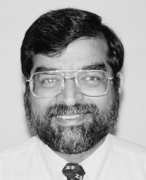 Indur Goklany
Indur Goklany
Independent Scholar
"The Improving State of the World"
4:30 PM • Room 1, Rockefeller Center
Cosponsored with the Dartmouth Libertarians
For most of mankind’s existence, life was poor, nasty, brutish, and short. Then came the Industrial Revolution, but assorted doomsayers warn us that industrialization accompanied by population growth, and economic and technological development are unsustainable—that the accompanying resource consumption, pollution and carbon emissions would reduce environmental and human well-being. Yet by every objective measure humanity has never been better off.
In this talk, Indur Goklany will draw on his book, The Improving State of the World, to discuss empirical trends in human well-being from the Industrial Revolution onward, why these improvements occurred and whether continued progress is possible.
Indur M. Goklany is an independent scholar whose work examines the interrelationships among globalization, economic development, human well-being, environmental quality, and technological change. Over a career spanning more than 35 years in government, think tanks and the private sector, Goklany has helped pioneer innovative environmental policy ideas, including emissions trading, habitat and biodiversity conservation through increased productivity and efficiency of land and water use, and boosting the adaptive capacity and resilience of developing countries against climate change through sustainable economic development, technological change, and trade. He has been associated with the Intergovernmental Panel on Climate Change since its inception in 1988 as an author, expert reviewer, and U.S. delegate. His books include The Precautionary Principle: A Critical Appraisal of Environmental Risk Assessment; Clearing the Air: The Real Story of the War on Air Pollution; and, most recently, The Improving State of the World: Why We’re Living Longer, Healthier, More Comfortable Lives on a Cleaner Planet. He was also the recipient of the 2007 Julian Simon Prize.
Wednesday, October 13, 2010
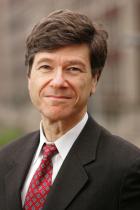 Jeffrey Sachs
Jeffrey Sachs
Director, Columbia University Earth Institute
“Ending Poverty in Our Generation: Still Time if We Tryâ€
4:30 PM • Room 28, Silsby Hall
Class of 1930 Fellow
Ending extreme poverty is not a dream but a practical possibility. Improvements in science, technology, and global networks make possible advances in wellbeing at unprecedented rates. Yet a high degree of social organization is needed for success. Sachs will sketch the main contours of an effective global effort against poverty, hunger, and disease to the year 2025.
Jeffrey D. Sachs is the Director of The Earth Institute, Quetelet Professor of Sustainable Development, and Professor of Health Policy and Management at Columbia University. He is also Special Advisor to United Nations Secretary-General Ban Ki-moon. From 2002 to 2006, he was Director of the UN Millennium Project and Special Advisor to United Nations Secretary-General Kofi Annan on the Millennium Development Goals, the internationally agreed goals to reduce extreme poverty, disease, and hunger by the year 2015. Sachs is also President and Co-Founder of Millennium Promise Alliance, a nonprofit organization aimed at ending extreme global poverty. He is widely considered to be the leading international economic advisor of his generation. For more than 20 years Professor Sachs has been in the forefront of the challenges of economic development, poverty alleviation, and enlightened globalization, promoting policies to help all parts of the world to benefit from expanding economic opportunities and wellbeing. He is also one of the leading voices for combining economic development with environmental sustainability, and as Director of the Earth Institute leads large-scale efforts to promote the mitigation of human-induced climate change. In 2004 and 2005 he was named among the 100 most influential leaders in the world by Time Magazine, and was awarded the Padma Bhushan, a high civilian honor bestowed by the Indian Government, in 2007. Sachs lectures constantly around the world and was the 2007 BBC Reith Lecturer. He is the first holder of the Royal Professor Ungku Aziz Chair in Poverty Studies, at the Centre for Poverty and Development Studies, University of Malaya. He is author of hundreds of scholarly articles and many books, including the New York Times bestsellers Common Wealth: Economics for a Crowded Planet (Penguin 2008) and The End of Poverty (Penguin, 2005). Sachs is a member of the Institute of Medicine and is a Research Associate of the National Bureau of Economic Research. He has received many honorary degrees, most recently from Cracow University of Economics, Ursinus College, Whitman College, the Mount Sinai School of Medicine, Ohio Wesleyan University, Trinity College Dublin, the College of the Atlantic, and Southern Methodist University. Prior to joining Columbia, Sachs spent over twenty years at Harvard University, most recently as Director of the Center for International Development. A native of Detroit, Michigan, Sachs received his B.A., M.A., and Ph.D. degrees at Harvard.
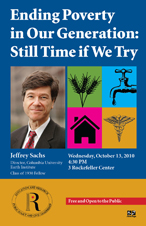
Monday, October 18, 2010
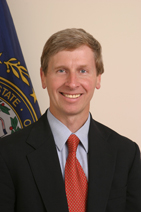 A Discussion with Governor John Lynch
A Discussion with Governor John Lynch
7:00 - 8:00 PM • Hinman Forum, Rockefeller Center
Co-sponsored with the Dartmouth College Democrats
Wednesday, October 20, 2010
 Leah Platt Boustan
Leah Platt Boustan
Assistant Professor, Department of Economics
University of California, Los Angeles
"Black Migration and the Transformation of Northern Cities in the 20th Century"
4:30 PM • Room 3, Rockefeller Center
Co-sponsored with the Dartmouth Economics Department
In 1900, more than 90 percent of African-Americans lived south of the Mason-Dixon Line. Over the next 70 years, five million blacks left the South to settle in industrial cities in the North and West. This migration flow fundamentally reshaped the complexion of American cities. Many white households responded to black arrivals by relocating to the suburbs. These households preferred white suburbs over white neighborhoods in the central city because they offered political and fiscal autonomy from city problems. This talk will present the economic history of the black migration and white flight, which together led to the physical and political separation between whites and blacks that remains a defining characteristic of American metropolitan areas today.
Leah Boustan is an Assistant Professor of Economics at UCLA and a faculty research fellow at the National Bureau of Economic Research (NBER). Her work focuses on the role of internal and international migration in U.S. economic history. One strand of her research examines the consequences of the Great Black Migration on northern cities and labor markets in the mid-twentieth century. She is also interested in who chose to migrate from Europe to the United States during the Age of Mass Migration (1850-1913) and how these migrants fared in the U.S. labor market. She holds an A.B. from Princeton University and a Ph.D. from Harvard University, both in economics.
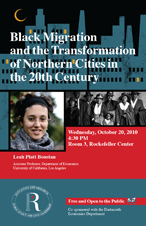
Friday, October 22, 2010
"Midterm Madness 2010: What Will Happen in the November Elections and Why?
Predictions and analysis of the upcoming midterm elections"
3:00 PM • Class of 1930 Room, Rockefeller Center
Panel Discussion co-sponsored with the Program in Politics and Law and the Government Department
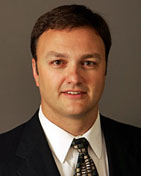 Moderator: Dean Lacy, Professor of Government, Dartmouth College
Moderator: Dean Lacy, Professor of Government, Dartmouth College
Panelists:
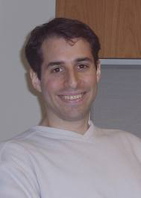 |
Joseph Bafumi, Professor of Government, Dartmouth College |
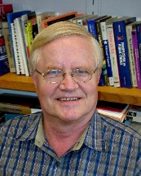 |
Robert S. Erikson, Professor of Political Science, Columbia University |
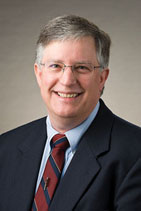 |
Charles H. Franklin, Professor of Political Science, University of Wisconsin-Madison, Co-Founder of Pollster.com |
 |
Harry Enten, Dartmouth College Class of 2011 |
 |
Ted Schroeder, Dartmouth College Class of 2011 |
Saturday, October 23, 2010
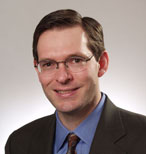 Brent A. Wilkes '88
Brent A. Wilkes '88
National Executive Director, League of United Latin American Citizens (LULAC)
“Immigration and Advocacy in the USâ€
6:30 PM • Collis Common Ground
Lambda Upsilon Lambda’s 13th Annual ";Noche Dorada"; Gala &; Banquet
Keynote Speaker: Brent A. Wilkes is the National Executive Director for the League of United Latin American Citizens this country's largest and oldest Hispanic organization. Wilkes manages the operations of the LULAC National organization with primary focus on national policy and legislative advocacy, membership development, program development, and resource development.
A graduate of Dartmouth College in 1988, Wilkes majored in Government and Philosophy and studied Spanish in Morelia, Mexico. He has worked in various capacities for LULAC since 1988 including Special Projects Coordinator, Resource Developer, and Director of Policy &; Development. He went to work for the LULAC National Office in 1996 and assumed the newly created position of National Executive Director in April of 1997.
As the LULAC National Executive Director, Wilkes is working hard to improve the quality of life for Hispanic Americans by guiding LULAC on its way to becoming a million-member organization with extensive legislative, public policy, and service activities in Hispanic communities throughout the United States.
Wilkes is widely credited with strengthening LULAC's programs, advocacy efforts, staffing, events and revenue since opening LULAC's National Office in Washington, DC in 1996. Since that time LULAC's revenue has tripled, staffing has grown from one to over twenty and the organization has taken a leadership role on key issues affecting Latinos in Washington and throughout the country.
In 2004, Wilkes helped launch the LULAC Leadership Initiative to strengthen LULAC's programs and serves at the grass-roots level. The initiative has already resulted in the establishment of 23 community technology centers, 26 housing counseling programs and 10 middle school science programs.
Wilkes currently serves as chair of the civil rights committee of the National Hispanic Leadership Agenda a nonpartisan coalition of the major Hispanic national organizations which develops a consensus policy agenda and promotes public awareness of the principal issues facing Latinos. He is also an active board member of the Hispanic Association on Corporate Responsibility which advocates for the inclusion of Hispanics in corporate America at a level commensurate with Hispanic economic contributions.
As a LULAC spokesperson, Wilkes frequently is quoted in national newspapers and publications and has appeared on radio and television shows including CNN, CSPAN and Fox News. A recipient of numerous acknowledgements and awards, he is most proud of his LULAC Youth Advocate of the Year award presented in 2003.
Brent and his wife are proud parents of two boys.
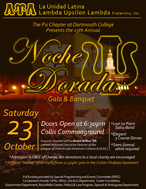
Tuesday, October 26, 2010
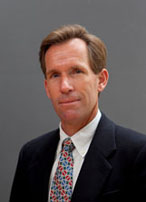 Dartmouth College Democrats and Dartmouth College Republicans Debate
Dartmouth College Democrats and Dartmouth College Republicans Debate
Moderator, Ronald Shaiko, Professor, Senior Fellow and the Associate Director for Curricular and Research Programs, Rockefeller Center
7:00 PM - 9:00 PM • Room 28, Silsby Hall
Cosponsored with the Dartmouth College Democrats and the Dartmouth College Republicans
Ronald G. Shaiko is a Professor, Senior Fellow and the Associate Director for Curricular and Research Programs at The Nelson A. Rockefeller Center for Public Policy and the Social Sciences. In November of 2007, he received the Linda '82 and Paul Gridley Faculty Fellow Award from the Dean of the College; the award recognizes exemplary faculty involvement outside of the classroom. Prior to coming to Dartmouth, Shaiko was the Fulbright Distinguished Chair in American Politics in the American Studies Center at Warsaw University in Poland during the 2000-2001 academic year. Throughout the decade of the 1990s, Shaiko taught at American University, where he founded and served as the academic director of the Lobbying Institute. During his 10 years at American, Shaiko served as an American Political Science Association Congressional Fellow in the U.S. House of Representatives in 1993-1994 and as a Democracy Fellow at the United States Agency for International Development in 1998-1999.
Thursday, October 28, 2010
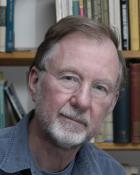 Dennis Thompson
Dennis Thompson
Alfred North Whitehead Professor of Political Philosophy
Director Emeritus, Edmond J. Safra Foundation Center for Ethics
Harvard J.F. Kennedy School of Government
"Campaign Ethics: The Vices of Misinformation and Manipulation"
4:30 PM • Room 3, Rockefeller Center
The William H. Timbers ’37 Lecture
In cooperation with the Dartmouth Legal Studies Faculty and the Dartmouth Lawyers Association
What principles should we use to judge the conduct of political campaigns? We should care less about fair competition among the candidates, and more about the ability of voters to exercise free choice. Campaigns are not great moments of civic education, but neither should they be occasions for misinformation and manipulation. This talk looks at examples of campaign practices in the past to develop some principles for assessing campaigns in the future.
Dennis F. Thompson is the Alfred North Whitehead Professor of Political Philosophy at Harvard University, and the founding director of the university-wide Edmond J. Safra Center for Ethics. He has served as Associate Provost and as Senior Adviser to the President of the University. His recent books include: Restoring Responsibility: Ethics in Government, Business, and Healthcare; Just Elections: Creating a Fair Electoral Process in the United States; Ethics in Congress: From Individual to Institutional Corruption; and Political Ethics and Public Office. He co-authored (with Amy Gutmann) Why Deliberative Democracy? and Democracy and Disagreement. He has also been a consultant to numerous governmental and public organizations, including the American Medical Association, the Senate Ethics Committee, the Office of Personnel Management, the Department of Health and Human Services, and the Joint Ethics Committee of the South African Parliament.
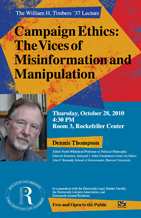
Thursday, November 4, 2010
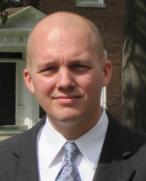 A Dartmouth Centers Forum Event
A Dartmouth Centers Forum Event
Josh Compton
Senior Lecturer in Speech, Institute Writing Rhetoric, Dartmouth College
"Freespeaking: Speaking With (and Listening Up) Before Speaking Out"
5:00 – 6:30 PM • Faculty Lounge, The Hopkins Center of the Arts
This interactive event is limited to 30 Dartmouth student participants. Please email Sarah Morgan at sarah.i.morgan@dartmouth.edu before October 29, 2010 at 12 noon if you are interested in participating in this event.
The Dartmouth Centers Forum consists of the following members:
Allwin Initiative for Corporate Citizenship, Collis Center for Student Involvement, Dartmouth Center for the Advancement of Learning (DCAL), Dartmouth College Library, Ethics Institute, Hood Museum of Art, Hopkins Center for the Arts, Institute for Security, Technology, and Society (ISTS), The John Sloan Dickey Center, The Nelson A. Rockefeller Center, Leslie Center for the Humanities, and Tucker Foundation.
Speaking out through public speaking is much more interesting—for the speaker and for the audience—when speech is more like dialogue than monologue. In this interactive workshop, Josh Compton, Senior Lecturer in Speech in the Institute for Writing and Rhetoric at Dartmouth College, offers freespeaking—an approach that is similar to freewriting—as a way for speakers to consider dialogue as a vital part of effective, powerful speechmaking. Before we speak out, pre-speech talk can help us to discover ideas, refine arguments, and incorporate multiple perspectives as we inform our own views. Dialogue can also help by modeling delivery that engages audiences—much like good conversation—leading us toward more expressive and authentic communication and inviting our audiences to listen up. We can talk our way toward better public speaking, and in the process, find courage, enthusiasm, and our better voices.
Prof. Josh Compton is an award-winning teacher, researcher and public speaker. The National Speakers Association named him Outstanding Professor of the Year, and Pi Kappa Delta awarded him the Bob R. Derryberry Forensics Educator Award.
Prof. Compton’s scholarship in persuasion, political communication, and speech pedagogy has been recognized by international and national organizations, including Pi Kappa Delta, the Central States Communication Association, the International Communication Association, and the National Communication Association. He has been published in leading communication journals, including Human Communication Research, Communication Theory, Journal of Applied Communication Research, Communication Yearbook, and Health Communication.
Prof. Compton maintains an active public speaking schedule. He has led seminar sessions for the Department of Defense Joint Course in Communication; conducted interdisciplinary workshops at Dartmouth College; and presented his research at national and international academic conferences of the National Communication Association, International Communication Association, Association for Practical and Professional Ethics, and others. He served as a speechwriter for the Oklahoma Institute for Childhood Advocacy and was the First Lady of Oklahoma’s speechwriter during her early childhood education tour.
Wednesday, November 10, 2010
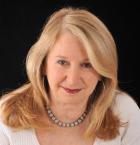 Barbara Kellerman
Barbara Kellerman
James McGregor Burns Lecturer in LeadershipCenter for Public Leadership
Harvard J.F. Kennedy School of Government
"'Shooting an Elephant' - or Why Be Leadership Literate?"
4:30 PM • Room 3, Rockefeller Center
The Portman Lecture in the Spirit of Entrepreneurship
In her just published book – ";LEADERSHIP: Essential Selections on Power, Authority, and Influence"; - Harvard and Dartmouth professor Barbara Kellerman provides a concise yet expansive collection of the great leadership literature. In her presentation she will argue as she does in the book - that there is a leadership canon that should (though it does not now) constitute the core of a leadership curriculum. This is literature about leadership, writers such as Confucius, Machiavelli, and Freud. It is literature as leadership, writers such as Paine, Marx and Engels, and Carson. And it is literature generated by leaders themselves, such as Elizabeth I, Churchill, and King. As she does in her book, Kellerman will provide running commentaries on the great works, indicating how and why they changed the world forevermore.
Barbara Kellerman is the James MacGregor Burns Lecturer in Public Leadership at Harvard University’s John F. Kennedy School of Government. She was the Founding Executive Director of the Kennedy School’s Center for Public Leadership, from 2000 to 2003; and from 2003 to 2006 she served as the Center’s Research Director. Kellerman has held professorships at Fordham, Tufts, Fairleigh Dickinson, George Washington, and Uppsala Universities. She also served as Dean of Graduate Studies and Research at Fairleigh Dickinson, and as Director of the Center for the Advanced Study of Leadership at the Academy of Leadership at the University of Maryland.
Kellerman received her B.A. from Sarah Lawrence College, and her M.A., M.Phil., and Ph.D. (1975, in Political Science) degrees from Yale University. She was awarded a Danforth Fellowship and three Fulbright fellowships. At Uppsala (1996-97), she held the Fulbright Chair in American Studies. Kellerman was cofounder of the International Leadership Association (ILA), and is author and editor of many books including Leadership: Multidisciplinary Perspectives; The Political Presidency: Practice of Leadership; and Reinventing Leadership: Making the Connection Between Politics and Business. She has appeared often on media outlets such as CBS, NBC, PBS, CNN, NPR, Reuters and BBC, and has contributed articles and reviews to the New York Times, the Washington Post, the Boston Globe, the Los Angeles Times, and the Harvard Business Review.
Some of her recent books are Bad Leadership: What It Is, How It Happens, Why It Matters (2004); a co-edited (with Deborah Rhode) volume, Women &; Leadership: State of Play and Strategies for Change (2007); and Followership: How Followers are Creating Change and Changing Leaders (2008). Kellerman speaks to audiences around the world, including in recent years Berlin, London, Moscow, Rome, Sao Paolo, Shanghai, Zurich, Jerusalem, Turin, Toronto, and Montreal. She is on the Advisory Board of the Leadership Research Network, on the Advisory Panel of the White House Leadership Project Report, on the editorial Board of Leadership Quarterly, and on the Publications Committee of the International Leadership Association. She is ranked by Forbes.com as among “Top 50 Business Thinkers†(2009) and by Leadership Excellence in top 15 of 100 “best minds on leadership†(2008-09). Her latest book, Leadership: Essential Selections on Power, Authority, and Influence, was published in Summer 2010 by McGraw-Hill - and in Fall 2010 she is Visiting Professor of Leadership at Dartmouth.
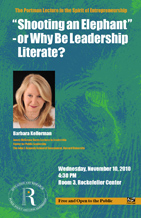
Thursday, November 11, 2010
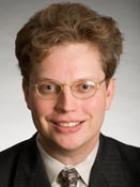 Sydney J. Freedberg, Jr.
Sydney J. Freedberg, Jr.
Investigator, Policy at the Sharp End Project
Former Defense Reporter for “The National Journalâ€
"Policy at the Sharp End: Listening to Veterans of Iraq &; Afghanistan."
4:30 PM • Room 3, Rockefeller Center
Veterans Day Speaker
Supporting the Dartmouth Centers Forum annual theme "Speak Out! Listen Up!"
No one understands war like those who fight it. Since 2004, Freedberg has spent hundreds of hours interviewing over 150 military personnel about their experiences in Afghanistan and Iraq in order to capture both their personal stories and their professional insights. The participants in this ongoing oral history project, overwhelmingly officers and experienced NCOs, are more than human interest items or patriotic object lessons. They are experts, each with first-hand experience of issues of national importance, from counterinsurgency tactics to military technology to how deployments stress the force, and their voices must be heard in the national policy debate.
Sydney J. Freedberg Jr. has covered the military and homeland security for National Journal since November 1997, writing on subjects as diverse as veterans’ benefits, nuclear terrorism, military computer networks, and regional tensions between Pakistan and India. He wrote his first article about what became known as “homeland security†in 1998, his first article about what became known as “military transformation†in 1999, and his first article about “asymmetrical warfare†in 2000. Since 2004, he has been conducting in-depth interviews with military personnel about their experiences in Afghanistan and Iraq for a series of stories that combine oral history with policy analysis. One piece in this series, his January 2007 cover story on Marine Corporal Jason Dunham and other service members decorated for valor, won the Atlantic Media Company’s internal award for “best story of the year†across all of the company’s seven periodical publications.
Before joining National Journal, Sydney Freedberg worked for the late Michael Kelly at The New Republic. He earned a bachelor's degree, summa cum laude, from Harvard University and a master's from Cambridge University (United Kingdom), both in modern European history. He is the son of the late Sydney J. Freedberg Sr., a World War II veteran and historian of Italian Renaissance painting.
Freedberg lives in Washington, DC, with his wife, whom he met while they were both working at National Journal, and their daughter, who loves to sing and dance, especially when it is long past time for bed.
